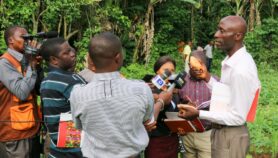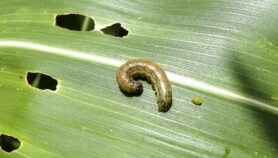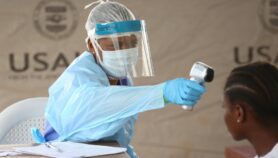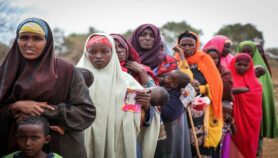Send to a friend
The details you provide on this page will not be used to send unsolicited email, and will not be sold to a 3rd party. See privacy policy.
Below is a roundup of news from or about Sub-Saharan Africa for the period: 31 December 2009–13 January 2010
Tanzanian text message project monitors antimalarial stocks
A mobile phone initiative has been launched to increase the availability of antimalarials in remote areas of Tanzania. SMS for Life — developed by IBM, Novartis and Vodafone, in association with the Roll Back Malaria Partnership — sends automated SMS reminders to healthcare staff to remind them to check stocks. Staff can then reply to a central UK-based database and deliveries can be arranged to replenish stocks. More>>
Ghana to pursue renewables
Ghana plans to meet its energy needs through renewables, it has announced. The country will build a ‘solar park’ in its northern region, and set up windmills in coastal areas "to generate about 600 megatonnes of power". Ghana is currently experiencing problems with its power supply, with its sole hydropower plant experiencing major water shortages. More>>
African Union and NEPAD to work on ICT policies
The African Union and the New Partnership for Africa’s Development (NEPAD) are to put their efforts into speeding up the implementation of information and communication technology (ICT) policy across the continent, following the failure of a regional broadband project because of a lack of support from member countries. NEPAD says that ICT is a priority and hopes that "policy harmonisation" will facilitate the rollout of ICT projects. More>>
Solar power for schools
Solar panels are to provide lighting for 117 schools and health clinics in rural Kenya, with the launch of a US$3.6 million solar pilot project. Most of the buildings are not covered by the national grid and have never had electricity before. If the project is successful, there are hopes that it can be expanded to the rest of the country. Kenya’s goal is to make renewable energy nationally available in the next two years. More>>
Researchers to study impact of climate change on East African food security
US researchers will study the impacts of climate change on East African countries including Kenya, Tanzania and Uganda over the next two years. The team have received a US$430,000 Rockefeller Foundation grant to obtain local climate data that can provide agriculturalists with information on climate change’s effects on various crops, ultimately enabling them to develop hardier varieties. More>>
African universities to boost agricultural learning
African educators will receive assistance from Michigan State University in developing open access agriculture education materials for students. The 18-month pilot project, AgShare Open Education Resources, has a US$1 million grant from the Bill and Melinda Gates Foundation to create make content such as textbook material and videos available via the Internet. Its overall goal is to boost agricultural practices in the country. More>>
Starting HIV treatment earlier lowers costs
Starting HIV treatment earlier, when a patient’s immune system is stronget, doesn’t just have health benefits — it’s cheaper too. A study of more than 10,000 HIV-infected adults in a private HIV care programme in southern Africa, published in PLoS Medicine last month (1 December) said that earlier treatment, can lower costs during the first months of treatment. More>> [![]() 716kB]
716kB]
South Africa launches biodiversity information portal
The South African National Biodiversity Institute will launch an online biodiversity information portal later this month (28 January) to mark the start of the International Year of Biodiversity. The Biodiversity Advisor will be a user-friendly guide for developers, planners and scientists wanting to access information such as the distribution of a particular species across South Africa. More>>
Compiled by Kimani Chege. Additional reporting by Munyaradzi Makoni, Linda Nordling and Frederick Opoku.
If you would like to suggest a story for this news in brief, please email [email protected]













